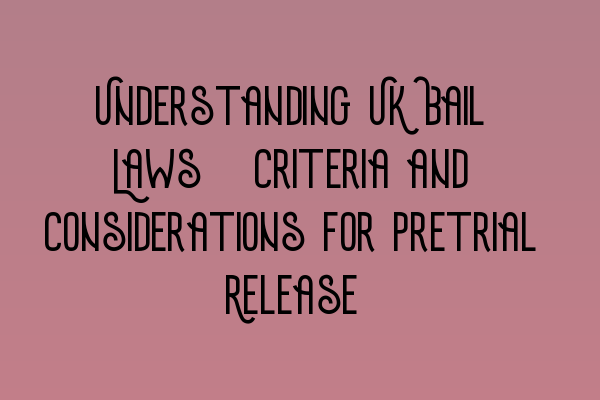Understanding UK Bail Laws: Criteria and Considerations for Pretrial Release
When it comes to criminal cases in the United Kingdom, one important aspect is the decision of whether or not to grant bail to the accused individual. Bail refers to the temporary release of a person who has been charged with a crime, allowing them to remain out of custody until their trial. In this article, we will dive into the criteria and considerations for pretrial release under UK bail laws.
Criteria for Bail
The decision to grant bail is determined by several key factors that are taken into consideration by the court. These criteria include:
- The seriousness of the offense: The court will assess the severity of the alleged crime. More serious offenses may increase the risk of flight or reoffending, which could impact the decision to grant bail.
- Risk of absconding: The court will consider the likelihood of the accused fleeing to avoid facing trial. Factors such as ties to the community, previous history of absconding, and access to financial resources will be evaluated.
- Public safety: The safety of the public is paramount, and the court must assess whether the accused poses a threat to the community. Factors such as the nature of the offense, any previous criminal history, and the likelihood of reoffending will be taken into account.
- Witness intimidation: If it is believed that the accused may attempt to intimidate witnesses or interfere with the judicial process, this will be a significant consideration in determining whether bail should be granted.
- Availability and strength of evidence: The court will consider the strength of the evidence against the accused and whether there is a likelihood of conviction. This factor helps assess the risk of the accused escaping justice.
Considerations for Pretrial Release
In addition to the criteria mentioned above, the court will also take into account various factors when considering pretrial release. These considerations include:
- Ties to the community: The court will assess the accused individual’s connections to the local community, such as family, employment, and other obligations. Strong ties increase the likelihood of the accused appearing in court and complying with bail conditions.
- Suitable accommodation: The court will consider whether the accused has a stable and appropriate place to stay if released on bail. This is important to ensure that the person has a stable environment and can be easily located if necessary.
- Employment and financial stability: The court will take into account the accused’s employment situation and financial stability. This helps determine whether the person has the means to support themselves and reduces the risk of reoffending due to financial strain.
- Previous criminal history: A person’s past criminal record will be considered when deciding on pretrial release. Repeat offenders or individuals with a history of non-compliance with court orders may be viewed as a higher flight risk.
- Mental health and substance abuse issues: If the accused has mental health or substance abuse concerns, the court will consider the availability of appropriate treatment options and support services.
It is important to note that the decision to grant or deny bail ultimately rests with the court, and each case is evaluated on its individual merits. The court must balance the rights of the accused with the safety and interests of the public.
Conclusion
Understanding the criteria and considerations for pretrial release under UK bail laws is crucial for individuals involved in criminal cases. By assessing the seriousness of the offense, risk of absconding, public safety concerns, witness intimidation, and the strength of the evidence, the court determines whether bail should be granted. Additionally, factors like ties to the community, suitable accommodation, employment and financial stability, previous criminal history, and mental health/substance abuse issues are taken into consideration for pretrial release. This comprehensive evaluation ensures that the decisions made uphold justice while safeguarding the public.
For further information on the UK legal system and qualifying as a solicitor, make sure to check out our related articles:
- SQE Exam Prep: Essential Study Materials for Aspiring Solicitors
- Demystifying the Solicitors Qualifying Examination Format
- LLC Formation Made Simple: Step-by-Step Guide for UK Entrepreneurs
- LLC Formation: A Step-by-Step Guide for UK Entrepreneurs
- Business Regulations in the UK: A Comprehensive Overview
